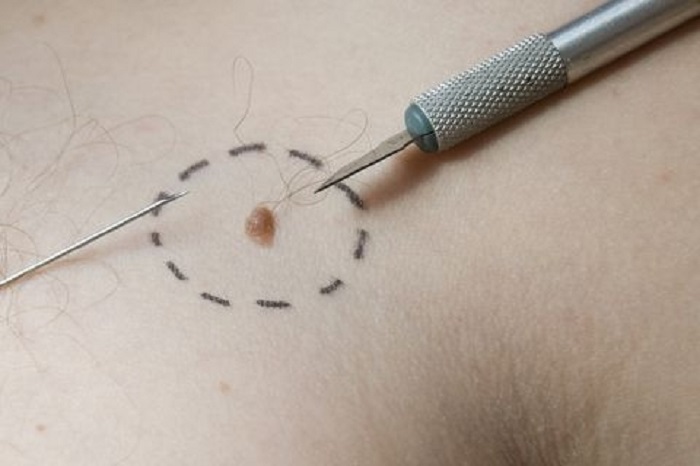Papilloma on the cervix is a pathology, which is an atypical growth of epithelial tissue on the walls of the organ. Such a neoplasm appears as a result of infection with the human papillomavirus.
This condition is fraught with serious consequences. Its danger also lies in the fact that a woman may not be aware of the presence of a growth on the cervix for a long time.

Содержание:
Factors leading to the occurrence of HPV
Papillomatosis occurs in women as a result of HPV infection. The disease may not make itself felt for a long time, but under the influence of negative factors that cause a weakening of the immune system, growths can form on any part of the body.
There are several routes of infection with the human papillomavirus. First of all, as a result of unprotected sexual contact with an infected partner.
And it doesn’t have to be sexual intercourse. Virus cells are transmitted by kissing through saliva. But you can get infected in a completely innocent way:
- Contact household. Papillomatosis is transmitted through personal hygiene items – a towel, a toothbrush, a razor. Also at risk are people who regularly visit public saunas and swimming pools.
- Generic. If the mother is a carrier of HPV, then during childbirth the virus can be transmitted to the child if there is a growth on the cervix.
Diagnostic methods
In the early stages, papilloma on the cervix does not appear. Over time, a woman can turn to a gynecologist with such complaints:
- pain in the vagina;
- atypical discharge, including bloody;
- swollen lymph nodes in the groin ;
- violation of the menstrual cycle;
- swelling of the lower extremities;
- loss of appetite, rapid weight loss.
If HPV is suspected in a woman on the cervix, the doctor performs a diagnostic procedure such as colposcopy. Its essence is to examine the body under a microscope.

Then the gynecologist takes a smear, sends it for a cytological examination. According to its result, one can judge the stage of the disease:
- Stages 1 and 2 are not dangerous, the structure of the epithelial tissue is not disturbed.
- Stage 3 requires additional diagnostic procedures, such as PCR, ultrasound.
- Stages 4 and 5 are the most dangerous . They indicate the presence of a malignant neoplasm.
In addition to colposcopy, another method for diagnosing papillomatosis on the cervix is a test using acetic acid. The doctor treats the organ with this solution, as a result of which, in the presence of growths, the neck will be unevenly colored.
In addition to establishing a diagnosis, papilloma on the cervix, it is required to determine the type of virus. Many of them are not dangerous and disappear on their own. The strain can be determined using PCR diagnostics.
Methods for the treatment of human papillomavirus in women
There are many ways to deal with papillomas on the cervix, this is both the use of medications and surgical intervention. Let’s consider each method in more detail.
In the early stages of the development of papillomatosis, it is enough to take antiviral drugs . The following medicines have proven themselves well in the fight against the disease: Interferon, Ingaron, Zovirax, Gevakson, Viferon. During the period of drug therapy, immunomodulating drugs are also prescribed to increase the body’s defenses.
Removal of HPV
There are several ways to remove growths on the cervix. The choice of a particular one depends on the degree of damage to the organ, as well as on the financial capabilities of the woman.

Chemical Methods
Destructors are used for chemical removal of neoplasms. They contribute to the death of pathological cells, as a result of which they disappear.
Since the membrane of the cervix is very sensitive, not every destructor drug is suitable for eliminating papillomas. Usually, such drugs are prescribed for this purpose: Solcoderm, Ferezol, trichloroacetic acid.
Physical Methods
Physical methods are used for extensive papillomatosis or in the later stages of the disease.
Surgical intervention
This is a classic method, which consists in excising a pathological formation with a scalpel. The operation is performed under anesthesia. After surgery, a woman needs a long period of rehabilitation.
This method is significantly inferior to modern methods of removing papillomas, but it is the only one that can remove malignant cells, therefore it is used for advanced forms of papillomatosis on the cervix.
Cryodestruction
The essence of the method is to freeze pathological neoplasms. For this, liquid nitrogen is used, after exposure, by which the growths are gradually rejected.

After such exposure, the epithelial layer is gradually restored, healthy cellular structures grow in place of the papilloma.
Laser vaporization
This is the most popular way to remove papillomas on the cervix today, and also the most gentle. Exposure to pathological cells with a laser is recommended for young girls who are still planning to give birth in the future. Laser removal of papillomas is effective even in advanced cases.
Radio wave method
This is a low-impact method of removing growths. It is a device that generates radio waves. Upon contact with tissues, they heat cellular and extracellular fluids, resulting in their evaporation and destruction.
Then, after a while, a white scab forms, which disappears after a few days. Removal of growths on the cervix is one of the safe methods, does not require postoperative hospitalization, the period of complete healing occurs within 2 months.

Electrocoagulation
It is an electrical cauterization of damaged areas. This method is only suitable for women who still do not plan to give birth in the future. The problem is that the current is highly conductive, which can leave scars on the cervix.
Traditional medicine
Alternative medicine offers many ways to deal with papillomas.
The most effective recipes for strengthening the immune system:
- Pine drink. You will need 2 tablespoons of chopped pine needles (it can be pine, cedar, spruce and others), pour 1 cup of boiling water. Put on a small fire to cook for about 20 minutes. Leave to brew for half an hour. Filter the finished broth, drink 1 tablespoon 3 times a day.
- Potato juice. You should take red potato tubers, rinse thoroughly, do not cut the skin, remove only dark places. Grind with a blender or meat grinder. Squeeze out the juice from the resulting slurry using gauze. Take 100 ml 3 times a day one hour before eating.
- Juniper. Every morning, you need to eat a handful of juniper berries on an empty stomach, chewing thoroughly.

Possible complications and prognosis
Ignoring the problem that has arisen can cause a number of serious complications in the future:
- the risk of degeneration of papilloma into a malignant tumor;
- possible damage to the growth can cause bleeding and inflammation in the cervix.
Therefore, when a neoplasm appears on the neck, it is imperative to conduct additional studies to determine the strain of the virus. Then delete it anyway. Timely resolution of the problem will help to recover without unpleasant consequences.
HPV prevention and the need for vaccination
To avoid HPV infection or its progression, you can get vaccinated against this virus. The advantage of this procedure is that the injected serum protects against oncogenic strains. If there is no possibility or desire to make a vaccine, you should strictly adhere to preventive measures to avoid HPV infection:
- use barrier methods of contraception during sexual intercourse;
- get rid of bad habits – they increase the risk of activating the virus;
- regularly undergo examinations by a gynecologist for preventive purposes – at least once every 6 months, if there are no complaints;
- take vitamins regularly to strengthen the immune system.
Papillomas on the cervix is an insidious disease, since in most cases it is asymptomatic. Therefore, every woman should regularly go for examinations to the gynecologist. If such a problem is found, treatment should be started immediately.







